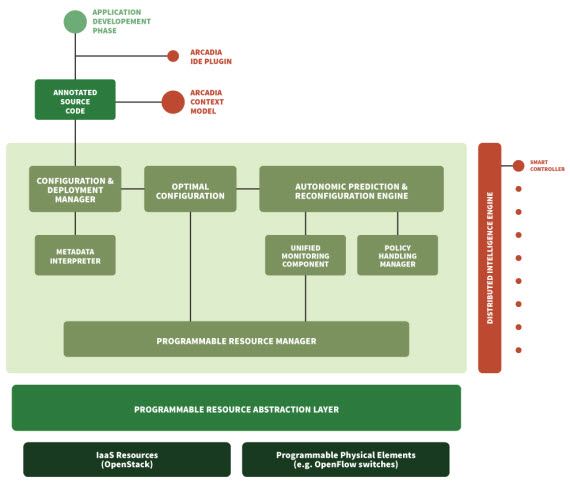Based on the report "Toward a Strategic Agenda for Software Technologies in Europe" of the Information Society Technologies Advisory Group, it could be strongly argued that the "Future Internet" software will be the critical infrastructure on which all other critical infrastructures will depend. The technological developments that are realized are changing the dynamics of the software industry and posing new requirements and opportunities for improving Europe's competitive position in software.
A transition from the 'intelligent design' approach, which currently rules software engineering to meta-design approaches as well as self-combining software systems has to be realised. The proposed approaches have to take into account the inability of software engineers to foresee all possible situations that systems, connected to the open physical world, have to face.
Thus, focus should be given on the design of software components that have the ability to collaborate in an autonomous and decentralized fashion. Furthermore, the deployment of systems and optimisation platforms that take advantage of the emerging programmability of the underlying infrastructure should be fully exploited towards the design of infrastructural-agnostic applications.
Towards this direction, the ARCADIA project aims to design and validate a novel reconfigurable-by-design highly distributed applications development paradigm over programmable infrastructure. The proposed framework is going to rely on the design and development of a novel reactive software development paradigm for concurrent and highly distributed applications as well as the design and development of a holistic applications' deployment and management framework over programmable infrastructure.
The notion of breakdown of applications in a set of micro-services along with the definition of appropriate service chaining schemes that are used during the applications' deployment and execution time is dominant within the project. Adoption of principles and techniques already available in novel software engineering paradigms as well as those evolved within the Network Function Virtualization (NFV) and Software Defined Networking (SDN) era are highly envisaged.
ARCADIA's reference implementation and developed toolkits are going to facilitate application developers to design and develop infrastructural-agnostic applications and lead to the evolvement of novel and innovative paradigms for the deployment of advanced applications, boosting in this way their productivity as well as the competitiveness of the EU software development industry.

Figure 1: ARCADIA Conceptual Architecture
Furthermore, the development of applications executed over programmable infrastructure will enable the deployment of eco-systems offering a plethora of innovation opportunities for software industry as well as SMEs. Advanced applications and end-to-end services may be introduced at lower risk while keeping the network reliable and secure and improving its utilization and operational efficiency.
It should be noted that validation of the designed and developed solutions within ARCADIA is going to be realized via three business-oriented use cases in the domains of "Quality of Service (QoS) and energy efficiency", "security and privacy" and "Internet of Things (IoT) and emergency communications".
The ARCADIA project is funded by European Commission under Horizon 2020 Programme (Grant Agreement No. 645372) and spans on the period January 2015 – December 2017.
Project Partners:
- Insight Centre for Data Analytics, National University of Ireland (NUIG), Ireland
- Stiftelsen SINTEF (SINTEF), NorwayTechnische Universität Berlin (TUB), Germany
- Consorzio Nazionale Interuniversitario per le Telecomunicazioni (CNIT), Italy
- Univerza v Ljubljani (UL), SloveniaGIOUMPITEK– Meleti Schediasmos Ylopoiisi kai Polisi Ergon Pliroforikis EPE (UBITECH), Greece
- WINGS ICT Solutions Information & Communication Technologies EPE (WINGS), Greece
- MAGGIOLI SPA (MAGGIOLI), Italy
- ADITESS Advanced Integrated Technology Solutions and Services Ltd (ADITESS), Cyprus
Contact:
Prof. Dr. Stefan Decker (Project Coordinator), Insight Centre for Data Analytics, National University of Ireland (NUIG), on +353 91 495011 or by email at stefan.deckerATderi.org.
